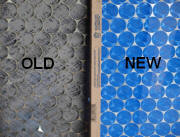|
|
|
Property Management Services of New Jersey is pleased to
offer our exclusive 12 point HomeGuard inspection service.
Performing regular maintenance helps protect your investment, maximizes
efficiency, and gives peace of mind. Below is a description of the
service we offer. Click here for
pricing information or to schedule your service.
|
|||
| 12 Point HomeGuard Service |
To sign up, click here. |
||
| What It Is |
What We Do |
Why It's Important |
|
|
|
|
Remove each detector, visually inspect & clean the unit, replace the battery, reinstall and test |
The battery is a back up power source. When the battery loses it's charge, the alarm will make a loud, high pitched 'beep' to notify you. This usually happens at 3AM, the smoke detector keeps beeping and you end up putting it in the freezer so you can get back to sleep. |
|
|
This is a filter we recently changed! |
Remove the existing filter, place it in a plastic bag to contain the dirt and contaminants; replace with an energy efficient electro-statically charged filter. This filter is effective against microscopic allergens, bacteria, disintegrated feces (hey, the filter company wrote this, not me), tobacco smoke, insecticide dust, lead dust, mold spores, pollen, pet dander, nuisance dust, and dust mite debris. |
Air filters should be changed every 3 months. Once clogged, the air quality in your home is affected as well as the energy efficiency of the heating and air conditioning system. This can result in poorer air quality, higher utility bills and a reduced lifespan of your HVAC unit. |
|
|
|
Remove the condensate line inspection cover; blow out the line to clear any accumulated debris, mold, etc.; disinfect with a 10% bleach solution; replace cover. |
This is a drain line which runs from the drain pan in the air conditioning unit to a drain on the floor. When this line becomes obstructed, the condensation in the pan cannot drain and begins to drip into and through the air conditioning unit on and onto the floor. There have been a number of units where clogged condensate lines have caused damage to the HVAC unit, as well as caused water damage to the units below resulting in expensive repairs and insurance claims. |
|
|
|
Remove and clean filter. Replace if needed. |
This filter traps the escaping grease and smoke from the range. When the grease builds up, there is (in addition to the smell of old grease), a potential for fire and damage to the microwave oven. |
|
|
|
Open and visually inspect the seals around all windows and doors. |
A damaged seal can allow water penetration into your home, or into the walls, with the potential of causing damage to your home. Tight seals also prevent heating and cooling loss. |
|
|
|
Check for missing or damaged screens; inspect for signs of forced entry. |
Damaged or missing screens can be an invitation to insects and other intruders. |
|
|
|
A visual inspection of the condition of the hoses which provide hot and cold water to your washing machine. |
These hoses can rupture without warning causing significant water damage particularly if not caught right away. Hint: It's a good idea to shut the spigots off when you are away from home for an extended period of time. |
|
|
|
Remove the aerator, clean and replace. |
Mineral buildups can restrict water flow as particles are trapped in the screen. |
|
|
|
Remove the toilet lid; inspect the float mechanism, adjust as necessary. |
Recently, an owner had a water bill of over $1,000. The cause was a running toilet. The water company listened to the owner's appeal, but unfortunately, the bill had to be paid. |
|
|
|
Inspect burner element, relief valve, thermocouple, and flu |
A failure of any of these components can cause damage to the water heater, reduce efficiency, and in rare cases can cause a fire. |
|
|
|
Check to see that fire extinguisher is fully charged. |
Fire extinguishers are like life jackets on a boat. You don't even think about them until you really need one...this simple check will ensure that if you ever need it, it will be ready to go. |
|
|
|
Inspect nozzle and confirm ignition. |
It's nice to have a fireplace that provides instant comfort and atmosphere. We'll make sure that the next time you flip the switch, the fire starts up. |
|
To sign up, click here. |
|||

